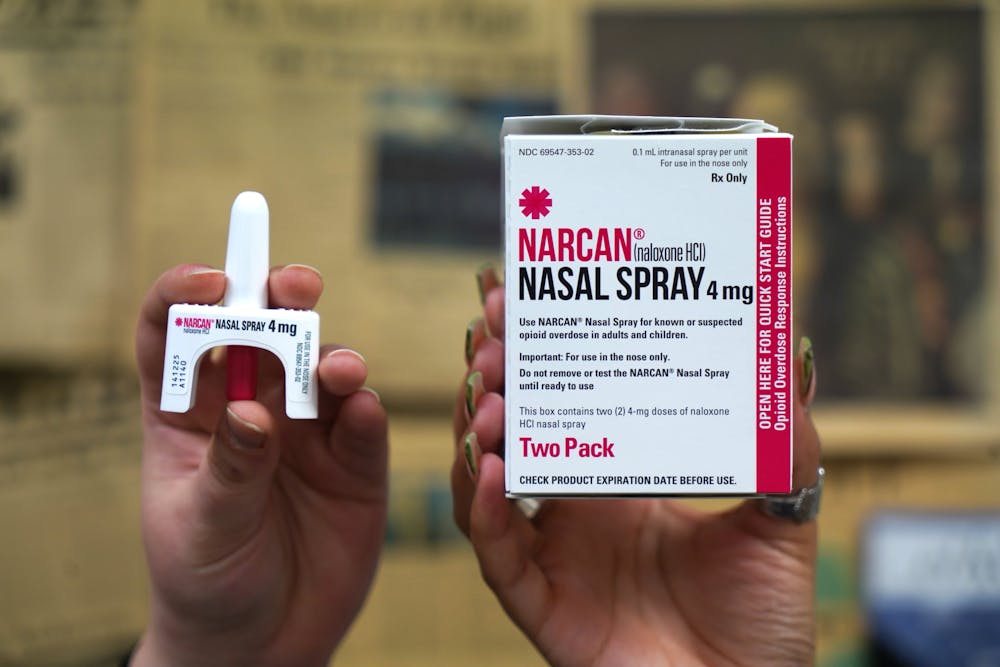From the Newsstands: This story appeared in The Eagle's December 2023 print edition. You can find the digital version here.
Harm reduction is becoming an increasingly popular discussion topic on college campuses across the U.S. as the Centers for Disease Control reports fatal drug overdoses among teens are on the rise nationwide.
Harm reduction describes preventive measures taken to lessen the negative consequences of risky activities. It’s promoted by advocates as a necessary collection of tools and resources that can save lives.
“Harm reduction meets people where they are,” said College of Arts and Sciences alumna Hope Neyer. She volunteers with ShutDownDC, a democracy-focused group that offers trainings on topics including health and safety.
Neyer explained that harm reduction applies to a wide range of behaviors. For example, American University students can access safe sex supplies, such as condoms, in residence halls and at the Student Health Center, and all undergraduates are required to take an alcohol education training both online and in person before matriculating.
In general, popular drug use harm reduction strategies include carrying naloxone, widely known by its brand name, Narcan, which can stop opioid overdoses as they’re happening.
Test strips are another popular harm reduction tool. The National Institute on Drug Abuse reported a “7.5-fold increase from 2015 to 2021” in overdoses from fentanyl and similar synthetic drugs. The FDA also announced in 2022 that seized samples of fentanyl and other drugs have been laced with xylazine, a veterinary tranquilizer not approved for human use. Test strips for these substances can tell users if their drugs are laced with fentanyl or xylazine, preventing accidental overdoses.
The University does not currently supply either of these harm reduction methods on campus, but is “exploring the feasibility of providing placements of naloxone boxes, supplied with Narcan, across campus,” Vice President of Student Affairs Raymond Ou and Chief Financial Officer Bronté Burleigh-Jones wrote in an October email to the University community.
The email also said that University police officers this semester are “working with the Center for Well-Being for AUPD officers to be trained and will carry Narcan to administer to someone in a crisis.”
The University did not provide additional statements on these plans and redirected The Eagle back to the community-wide email when asked for comment.
The original email also provided off-campus resources to access Narcan across D.C., including by texting LiveLongDC at 888-811, ordering Narcan in the mail through Health Support Now or going to D.C. firehouse vending machines. One resource not mentioned in the email is HIPS, a harm reduction organization that has served the District since 1993.
Blythe Dellinger, HIPS’ data and reporting coordinator, says the services college students most often seek from the organization are Narcan, fentanyl testing strips and xylazine testing strips.
Dellinger said it is “dangerous” and “antithetical to a lot of the work that we do at HIPS” for universities not to provide these resources on college campuses.
"The best we can do is provide people with the resources to have the lesser amount of harm in their day-to-day life, so Narcan should definitely be available as well as any other resource that people would need,” Dellinger said.
Neyer agreed and shared a more personal experience.
“Another student and I did intervene in an opioid overdose in Tenleytown, and if American University students had free and non-stigmatized access to opiate reversal drugs, I think we would be better empowered to be, at risk of sounding corny, changemakers,” Neyer said. “The University has an opportunity to do something very simple to empower students to quite literally save lives, and honestly, it's a little disappointing that in a city facing a serious overdose problem, we haven’t enacted that yet.”
This article was edited by Kate Corliss, Jordan Young and Abigail Pritchard. Copy editing done by Isabelle Kravis, Sarah Clayton, Luna Jinks and Emilia Rodriguez.





